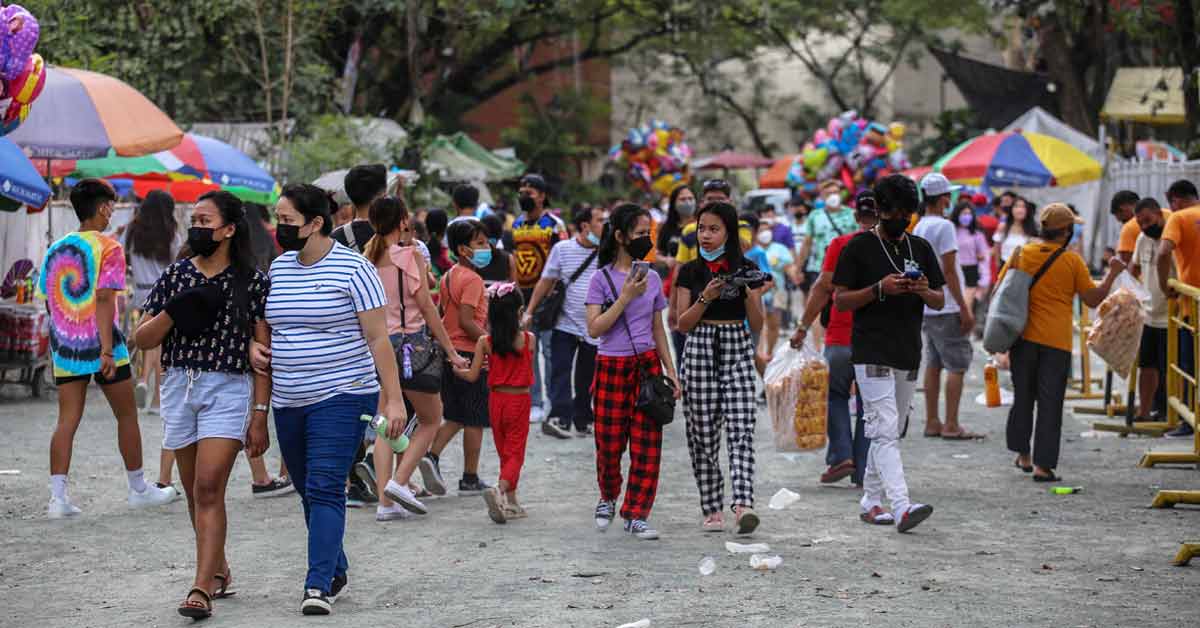Before the COVID-19 pandemic hit the country, the Philippines was perceived as the next Asian Tiger economy and one of the most robust and dynamic economies in ASEAN and the wider East Asian region.
Based on the World Bank's (WB) data and statistics, the country's average annual growth rate increased from 4.5 percent between 2000-2009 to 6.4 percent between 2010-2019. However, the COVID-19 pandemic caused economic damage to the country's growth and poverty reduction efforts.
In 2020, the Philippines’ gross domestic product (GDP) contracted to 9.5 percent, the country's lowest since World War II. In the second quarter of 2020, the country's GDP was as low as -16.9 percent. Nevertheless, the country's GDP recorded a growth of 7.1 percent in the third quarter of 2021.
Given the economic setbacks and challenges brought about by the pandemic to the Philippine economy, the country is trying its best to recover in a more calibrated manner by reopening the economy without compromising the overall health of its people.
The Duterte administration recognises the importance of foreign direct investments (FDIs) as one of the key economic drivers that will help the country move forward. Hence, the Philippine government is continuing its efforts and pushing legislative measures that will further liberalise the investment rules and regulations of the Philippines to attract the entry of more foreign investments to the country.
Legislative Measures
Hence, it is worth mentioning that some of the needed legislative measures that would be instrumental in shaping the country's competitiveness in attracting FDIs that the Duterte administration is pushing for include the game-changer Corporate Recovery and Tax Incentives for Enterprises Act (or CREATE), amendments to the Retail Trade Liberalization Act (RTLA), the Foreign Investment Act (FIA), and the Public Service Act (PSA).
CREATE lowers the corporate tax rate from 30 percent to 25 percent. This number will be reduced by one percentage point per year from 2023 to 2027. Prior to this law, the Philippines was one, if not the country with the highest corporate income tax among ASEAN member states. CREATE intends to rationalise fiscal incentives to attract more local and foreign investors/businesses/enterprises to invest in the country.
Another legislation signed by Duterte and enacted into law on 10 December, 2021, which will further ease restrictions on FDIs, painting the country as an attractive FDI destination, piecing together the objective of a quick economic recovery from the devastating impact of the COVID-19 pandemic, is the RTLA.
The RTLA lowers the paid-up capital requirement for foreign retail enterprises and other purposes. It is said to be an investor-friendly legislation, and will simplify and ease restrictions for foreign retailers that want to set up business in the country.
The other two pending amendatory bills are the PSA and the FIA. The amendments to the FIA, as per report by the bicameral committee (bicam), were ratified by both, the House of Representatives (HOR) and the Senate on 7 December, 2021 and are now pending review by the Office of the President (OP).
While the HOR and the Senate have passed their versions of the PSA amendatory bill, the said bill is still subject to the bicameral proceedings before ratification by both Houses and before submitting to the President for his approval.
Undoubtedly, once enacted into laws and implemented, these legislations are expected to facilitate economic growth, create jobs, open the country to more FDIs, and rally around the fast-track recovery of the Philippines from the ill effects of the pandemic.
Discriminatory PSA Amendments
However, the Senate version of the PSA bill seems controversial because of a specific provision.
The Senate Bill 2094 (SBN 2094), otherwise known as the Amendments to the PSA formulation, restrict investments by foreign state-owned enterprises (SOEs) on public utility, so-called "critical infrastructure" referred to as "public service" that operates, manages, or controls for public use" on any of the following: (a) distribution or transmission of electricity; (b) petroleum and petroleum products' pipeline distribution systems; (c) water pipelines distribution systems; and (d) wastewater pipeline systems; as well as (d) airports, seaports, public utility vehicles, and toll-ways or expressways. The rationale behind including such a provision is to protect national security.
It can be inferred that the provision of SBN 2094 is aimed at Chinese SOEs. To note, most Chinese enterprises/companies investing and doing business outside China are state-owned and controlled.
Contentions
In an online webinar last Thursday (13 January, 2021) with the theme, Risks and Opportunities of Foreign Investments and Senate Amendments to Public Services Act (SBN 2094) on Philippine Post-Pandemic Recovery, one of the country's top legal minds and constitutional experts, who is also running for senator in this May 2022 elections, former Presidential Spokesperson Atty. Harry Roque, who spoke at the webinar, expressed very strong sentiments against the provision, which prohibits the participation of SOEs.
Roque said, "We are supposedly liberalising the provision of public service, but here is an instance where we are expressly discriminating against foreign SOEs. This is discriminatory to China because, as you know, many of the companies engaged in public service, including power generation and power distribution, are state-owned enterprises. I submit that this discriminatory provision against state-owned enterprises, particularly from China, is patently unconstitutional. The Constitution itself says that everyone in the Philippines, which includes foreigners, are entitled to equal protection of the law, which means that a person's both natural and juridical similarly situated must be treated alike."
Roque asked why was there a need to discriminate against Chinese SOEs when in the first place, this is not germane to the law. The law is about liberalising the PSA because it is an antiquated law. The law recognises that if we are to achieve better public service to the people, we need to allow more players into the sector. Thus, according to Roque, the provision is not germane to the purpose of the law.
It is, according to him, contrary to the purpose of the law in allowing and liberalising the entry of as many players into the public service sector because ultimately, it is the consumers that will benefit when there is competition in the public service sector.
The senatorial candidate further said that to achieve ultimate Philippine development, we need to work with all partners, local and foreign, who can help us with technologies and resources that we don't have.
He cited the exploitation of mineral deposits in Recto (Reed) Bank as an example. "If we have the capital as well as the technical know-how to extract the mineral deposits from Recto Bank, we would have done so a long time ago. The reality is we don't, and that is why the government enters into service contracts, which, according to the Supreme Court, is not covered by the 60-40 rule," Roque added.
For Roque, foreign competition is always welcome because Filipino consumers will ultimately benefit from foreign competition.
Harvard-trained industrialist, business and civic leader, and President of the Federation of Filipino Chinese Chambers of Commerce & Industry (FFCCCII), Dr Henry Lim Bon Liong, who also spoke at the same webinar, said that at present, the country's ASEAN neighbours had a more significant share of FDIs. This stiff competition teaches Filipinos not to be complacent.
“The amendments to the PSA, which is part of President Duterte's legislative priorities, will hopefully make our foreign investment policies at par with our neighbours. We hope that the approval of the correct version of this bill in the House and Senate will pave the way for its enactment into law," Lim added.
Dr Lim urges the country's legislators to be more open-minded concerning foreign investments for the sake of Philippine global competitiveness and economic progress.
George Siy, a Wharton-trained economic analyst and director of the Integrated Development Studies Institute (IDSI), a think-tank based in Manila, argued during the webinar that many foreign investments and influence are already here. "Our telcos are capitalised by Indonesians and Singapore government SOEs, the National Grid by the Chinese," he said.
According to Siy, the country needs new capital and technology inflows from abroad into critical infrastructure. Building new markets will accelerate recovery and give the Filipino people a chance to prepare for the Fourth Industrial Revolution instead of languishing behind everyone. Siy likewise contended that the Philippines should assess the overall effect over time of its legislations and correct implementations.
Former Agriculture Undersecretary, Secretary-General of the Asia PV Industry Association (APVIA), Chairman of the Philippines Solar and Storage Energy Alliance Inc. (PSSEA), and the President of Sun Asia Energy, Inc. Tetchi Capellan, voiced out that in the context of SBN 2094, unfortunately, the glass is half full, because what it only allows is the transmission and the distribution aspect. It doesn't mention anything on power generation, which means energy generation will continue to be restricted to Filipinos.
According to her, the top five suppliers of solar panels worldwide are no longer Europeans or Americans. They're Chinese. These top five Chinese solar manufacturers have now transformed into investment entities.
Capellan also argued that the PSA (SBN 2094) is a good half-step forward. It is half-step precisely because there are still restrictions, and that includes the power generation part of the electricity supply chain or the energy ecosystem, and also the restriction on Chinese SOEs, which have an enormous amount of capital that can be deployed in the Philippines to reach the goal of 35 percent and 15-gigawatt (GW) hours supply of electricity.
Conclusion
To quote and paraphrase to some extent what Peter Laviña, President of Asian Center for Comparative Governance, Chairman of Philippines-China Mutual Cooperation Society, and Deputy Secretary-General of the Association for Philippines-China Understanding (APCU) said at the webinar:
The Philippines has one of the most restrictive investment policies in the region, which is why it is lagging behind its ASEAN and Asian neighbours. Now that it has decided to open up, it should open up to everyone. The Philippines should not restrict, discriminate or exclude anyone or any countries at all.
SBN 2094 targets Chinese companies, especially China SOEs, and is obviously a display of the prevailing Sinophobia of some legislators. Nevertheless, the Philippines should not legislate Sinophobia. As a country, we are, in fact, against racism and anti-China policies, and we should be watchful of these inserted provisions in our laws.
The Philippines should focus on economics and not on politics. These restrictive provisions being inserted by some Congress and Senate members are mainly due to politicking. They want to score points, but do not realise the implications of their proposals. Thus, Filipinos should be watchful of these things.
Lastly, before this bill becomes a law, upon signing by President Duterte, the said provision restricting foreign SOEs should be clarified further in the bicameral committee. Hopefully, members of Congress can go over these provisions.
In attracting FDIs, let the Philippines be open to all prospective foreign investors without discriminating a particular country or its SOEs. The Philippines will benefit in the same manner that its neighbours have from foreign investments.
The views expressed in this article are the author’s own and do not necessarily reflect those of The ASEAN Post.

